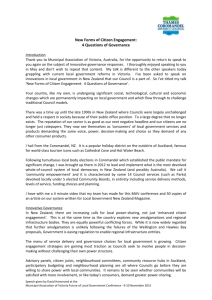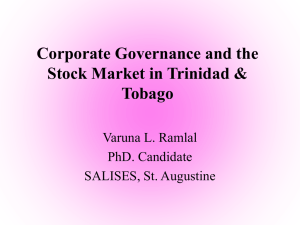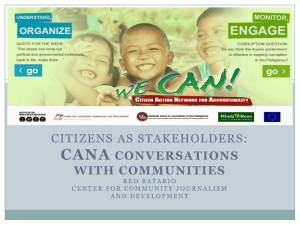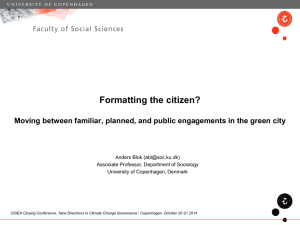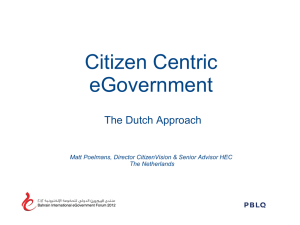Learning from the Luchtsingel
advertisement
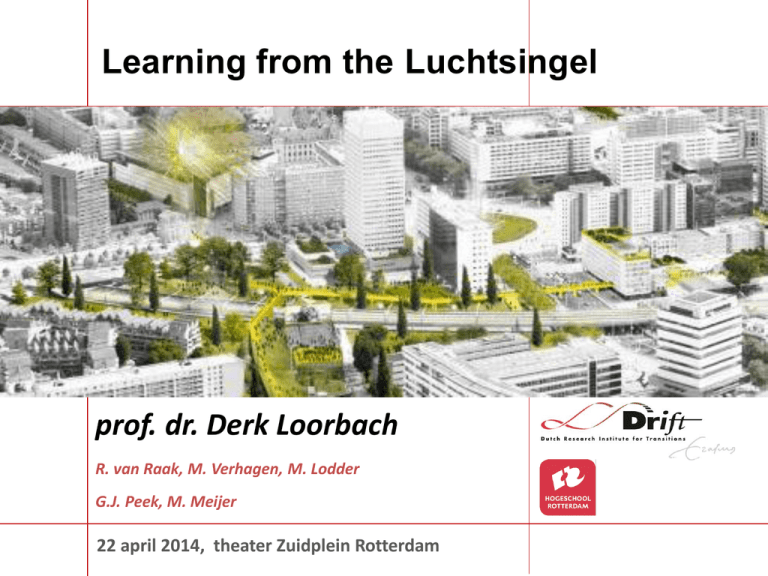
Learning from the Luchtsingel prof. dr. Derk Loorbach R. van Raak, M. Verhagen, M. Lodder G.J. Peek, M. Meijer 22 april 2014, theater Zuidplein Rotterdam Who DRIFT (Dutch Research Institute for Transitions) • Research Institute Erasmus University • Research and consultancy societal transitions • Interdisciplinary and cross sectoral research, education and experimental governance Hogeschool Rotterdam • Lectoraat Gebiedsontwikkeling & Transitiemanagement • Research and education new forms of area development • Integral approach sectors, life-cycle fases, sustainability and economy Core messages • We live in an era of change – Socially, ecologically, economically and institutionally • The city is the testing ground for transitions – Government and society reinvent themselves • ‘Luchtsingel’ as urban transition lab – For new type of area development and participation • ‘Burgerkracht’ requires organizational power – Bottom-up and top-down need each other 30-4-2014 THE TRANSITION PERSPECTIVE Symptoms of unsustainability 30-4-2014 Transition = regime change Long-term (one or two generations) fundamental change of structure, culture and practices in a societal (sub)system – culture: collective set of values, norms, perspectives (shared orientation), paradigms – structure: physical infrastructure, economic infrastructure, institutions, rules, regulations, collective routines – practices: behavior, operation, implementation Periodic, non-linear systemic shift common in ecological and socioeconomic systems Paradigm to analyse and influence complex societal change Transition levels Macro-level: landscape Sustainability, ICT, ageing population, economic crisis Meso-level: regime Growth orientation, planning, specilisation, topdown Micro-level: niches innovative ideas, projects, technologies, niche actors Based on Geels and Kemp, 2001 Transition phases stabilisation reconfiguration predevelopment tipping phase Sustainable Society? enhanced lock-in decline Based on Rotmans et al, 2001 Time Transitions in (Urban) Area Development 1950-1990 Government driven focused on building production 1990-2010 Governance driven focused on development profits 2010- Participation driven focussed on dealing with temporality Transitions in governance 1950-1980 Government creates society top-down 1980-2000 Governments facilitates markets and formal participation 2000- 30-4-2014 Governance with increased civil society initiative Rotterdam’s current regime • Fossile, stoney and large scale – Little diversity, green and small scale • Blueprints, plans and project development – Planned city made by professionals • Always changing, rebuilding, destroying and doing – Little vision, reflection, learning and balance 30-4-2014 Vision city development 30-4-2014 30-4-2014 Luchtsingel 30-4-2014 Elements • Pedestrian bridge • Dakakker • Parkpompenburg • Boxingschool • Hofbogendak • ‘Accelerating’ developments (‘aanzwengelen’) • ‘Communicationplatform’ 30-4-2014 Luchtsingel was elected by cross-section of the citizens New ‘burgerpanel’ survey indicates support from citizens of all age groups, educational levels and etnicities Source: uitslag verkiezingen Stadsinitiatief / analyse COS 30-4-2014 Why this research • Research into impact of all city initiatives • Learning for policy innovation, area development and next phase Luchtsingel • Reorienting complex spatial development Central District How: methods Combination of methods (triangulation): • Previous studies/date • Interviews • Questionnaires (firms in the area, citizens) • Documentanalysis – Plans, policy documents – Media analysis, online blogs and debates • Expert- & stakeholder session 4 stories + 2 reflections • Story of gradual area transformation • Story of city branding and image • Reflection from the perspective of area development • Story of civil society initiative on major scale • Story of doubt and criticism • Reflection from new governance perspective Luchtsingel, March 7 2014. PERSPECTIVE AREA DEVELOPMENT 30-4-2014 AREA DEVELOPMENT Gradual area transformation • Strong bottom-up development in the area, driven by a vision on long-term value development • Luchtsingel builds upon, connects and accelerates these developments • Crucial question whether Luchtsingel sustains and strengthens local scale bottom-up initiative or creates springboard for next phase of a new type of area development Source: ZUS 30-4-2014 AREA DEVELOPMENT Majority of local firms observes and expects impact…. Question to firms in the area: How big do you estimate the impacts of the Luchtsingel are on the local economy and real estate prices now and in the coming years? Luchtsingel, March 7 2014. AREA DEVELOPMENT …in different ways Luchtsingel, March 7 2014. AREA DEVELOPMENT Indicators for impact LS Tangible indicators for economic impact and future development: • Co-investment – Lower than originally proposed • Spin-offs – Already visible on modest scale • Expectations turn-over growth local firms – Over 80% expects positive impact on business in area, 40% on own firm. Luchtsingel, March 7 2014. AREA DEVELOPMENT Indicators for impact LS expected effect on own firm’s turn-over and/or value Source: DRIFT/online survey local firms Luchtsingel, March 7 2014. AREA DEVELOPMENT Iconic function? Broad impact across various media – Traditional and new professional media – General media (paper, TV, internet) Various target groups – Urban planning and project development (office space location) – Tourism – Creative industry Talk of the town Luchtsingel, March 7 2014. IMPACT Awareness in city Citizen panel: do you know the city initiative of the Luchtsingel? Source: Burgerpanel gem. R’dam/COS, preliminary results 30-4-2014 CITIZEN PARTICIPATION PERSPECTIVE 30-4-2014 CITIZEN PARTICIPATION Stadsinitiatief: citizen participation on enormous scale • Adaptive Luchtsingel versus ‘one-shot’ Stadsinitiatief • Larger scale means more impact? – Emphasis on elections – Initiative in the public space – Different phases and scales of participation • Before and after elections • City and direct area Luchtsingel, March 7 2014. CITIZEN PARTICIPATION Citizen’s satisfaction with LS Question to citizen panel: how satisfied are you with the Stadsinitiatief LS? Source: Burgerpanel gem. R’dam/COS, preliminary results 30-4-2014 CITIZEN PARTICIPATION Local firms see unique opportunities Local firms on Stadsinitiatief: The approach has resulted in a positive change, which conventional parties could not have realised The approach is a good way to develop from citizen’s initiatives Source: DRIFT / online survey local firms 30-4-2014 DOUBTS AND CRITICISM Doubts and criticism • Very diverse criticisms, both on Stadsinitiatief and Luchtsingel • Broader debates can be considered form of impact – Well-founded debates and criticisms related to governance and area development, spending public money • Extreme expectations and ambitious-realistic plan – Polarising all-or-nothing debate – Enormuous ‘public participation’ budget, but quite modest ‘public-space’ budget, no iconic budget • Seemingly toned-down plan because of budget control • Perception of only ‘elite’ support, at least not true for voters Luchtsingel, March 7 2014. DOUBTS AND CRITICISM Dissatisfied Rotterdammers voted differently or not… “LS has no added value for the city” AGREE DISAGREE Those who voted for LS Those who did not vote Those who voted different Source: Burgerpanel gem. R’dam/COS, preliminary results 30-4-2014 REFLECTIONS 30-4-2014 AREA DEVELOPMENT Transition in Urban Area Development • • • • • Move away from a process of city-making to city-being Although cities will keep growing in numbers of inhabitants, workers and visitors, most of the real estate is already built Development turns into redevelopment as (vacant) supply, such as office-buildings, does not match demand Temporary use is key in the redevelopment process of a city district; keeping it alive and altering it’s image Temporary use allows start-ups and creative class to Alocations they otherwise could not afford and, as such, supporting their growth AREA DEVELOPMENT Lessons from the Luchtsingel • Investment in urban infrastructure might lead to a dispersal of scarce property development potential, yet it stimulates bottom-up urban development • Involvement of professional civil-servants is essential for success • Investments in city-making upfront prevent districts from ‘dying’ during a lengthy redevelopment process • Investments in public space can be kick-starter of a bottom-up regeneration process, rather than as finally spending some of the development’s profit Participatory governance? • Unorthodox approach created breakthrough NEW GOVERNANCE – Working SMART and based on consensus could not have • Local government internally divided and confused – Participating, ´gedogen´, facilitating, directing, legitimizing, blocking, …? • Underestimated potential for learning and experimenting – More a continuous struggle • Area developing coalition sub-optimal – Low-levels of participation and transparency in the process • Luchtsingel as experiment demonstrates potential – But also the need for synergetic top-down and bottom-up forces Luchtsingel, March 7 2014. Conclusions • Luchtsingel exemplifies the dilemmas and possibilities of a new style urban area development • Luchtsingel connects, strengthens, opens up • Impact already noticeable, expectations for the future high and ambiguous • New phase requires broader vision and new style of governance 30-4-2014 Conclusions • Government struggles with participation if not supporting policy • Participatory governance requires redefining every role as well as playing multiple roles • Stadsinitiatief should be complemented by other (smaller scale) innovative instruments • Rotterdam should more consciously organize and experiment with such spaces as urban transition labs 30-4-2014 Thank you for your attention Voor meer informatie en publicaties: loorbach@drift.eur.nl www.drift.eur.nl www.ksinetwork.org www.twitter.com/drk75

